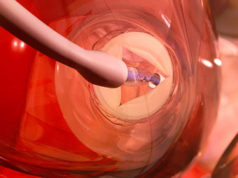 Aspirin-free prasugrel monotherapy following successful everolimus-eluting stent implantation demonstrated feasibility and safety without any stent thrombosis in selected low-risk patients with stable coronary artery disease (CAD). This was the conclusion of the ASET pilot study published in JACC: Cardiovascular Interventions. These findings may help to underpin larger randomised controlled studies to evaluate the aspirin-free strategy compared with traditional dual antiplatelet therapy (DAPT) following percutaneous coronary intervention (PCI), the study’s authors suggest.
Aspirin-free prasugrel monotherapy following successful everolimus-eluting stent implantation demonstrated feasibility and safety without any stent thrombosis in selected low-risk patients with stable coronary artery disease (CAD). This was the conclusion of the ASET pilot study published in JACC: Cardiovascular Interventions. These findings may help to underpin larger randomised controlled studies to evaluate the aspirin-free strategy compared with traditional dual antiplatelet therapy (DAPT) following percutaneous coronary intervention (PCI), the study’s authors suggest.
The study, which was authored by Norihiro Kogame (Department of Cardiology, Amsterdam University Medical Center, Amsterdam, The Netherlands), aimed to evaluate whether prasugrel monotherapy following successful everolimus-eluting stent implantation is feasible and safe in patients with stable CAD, as recent studies have suggested that short DAPT strategies may provide an adequate balance between ischaemic and bleeding risks in patients undergoing PCI. However, the study’s authors note, the complete omission of aspirin immediately after PCI has not been tested so far.
As part of the multicentre, single-arm, open-label trial patients undergoing successful everolimus-eluting stent implantation for stable CAD with SYNTAX (Synergy Between PCI With Taxus and Cardiac Surgery) scores <23 were included.
All participants were on standard DAPT at the time of index PCI. Aspirin was discontinued on the day of the index procedure but given prior to the procedure; prasugrel was administered in the catheterisation laboratory immediately after the successful procedure, and aspirin-free prasugrel became the therapy regimen from that moment. Patients were treated solely with prasugrel for three months.
The primary ischaemic endpoint was the composite of cardiac death, spontaneous target vessel myocardial infarction, or definite stent thrombosis, and the primary bleeding endpoint was Bleeding Academic Research Consortium types 3 and 5 bleeding up to three months.
In total 201 patients were enrolled from February 2018 to May 2019, all of whom underwent PCI for stable CAD. Overall, 98.5% of patients were adherent to prasugrel at 3-month follow-up, Kogame and colleagues report, and the primary ischemic and bleeding endpoints occurred in one patient (0.5%). No stent thrombosis events occurred, the study’s authors add.
The study’s authors conclude: “Aspirin-free prasugrel monotherapy was feasible and safe following successful DES implantation in a population of selected patients with stable CAD with low anatomic complexity. Our findings may help underpin larger randomised controlled studies to evaluate the aspirin-free strategy compared with traditional DAPT following PCI.”
Commenting on the findings, study co-author Pedro Lemos (Hospital Israelita Albert Einstein, Sao Paulo, Brazil), said: “Clearly, our results cannot be directly extrapolated to be applied in the routine practice. Though promising, further studies are needed to precisely evaluate whether aspirin-free strategies will benefit patients after PCI.”
In an editorial comment accompanying the article in JACC: Cardiovascular Interventions Usman Baber (University of Oklahoma Health Services Center, Oklahoma City, USA) writes that the study adds to the expanding evidence base evaluation short durations of DAPT after PCI. He writes: “As the field of post-PCI DAPT continues to evolve, it is clear that ASA-free strategies following a short duration of DAPT have emerged as viable alternatives to conventional antiplatelet strategies. Ongoing studies will further clarify the optimal patients and time point after PCI wherein such an approach may be initiated. Current evidence supports at least one to three months of DAPT before ASA withdrawal and although discontinuation of ASA immediately after PCI is not yet ready for clinical application, this hypothesis warrants formal evaluation in an adequately powered clinical trial.”










